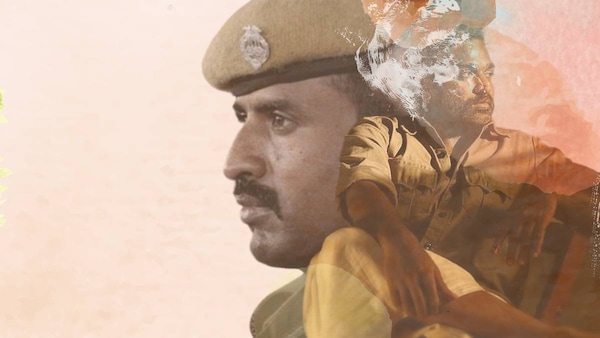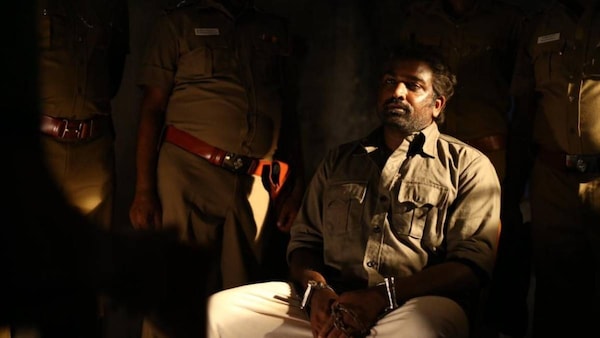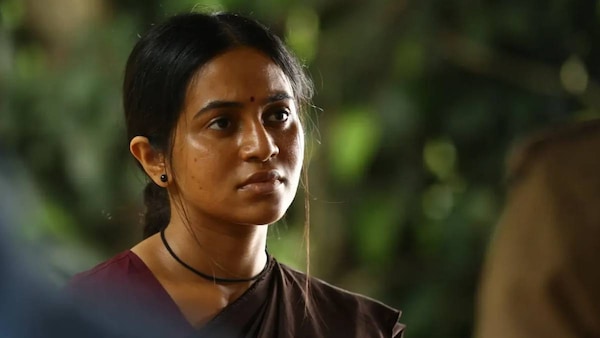Viduthalai Part 1: Political Film As An Effective Character Study

Last Updated: 02.39 PM, Apr 01, 2023
Vetrimaaran’s new film Viduthalai (Part 1) which means ‘freedom’, might suggest a story of the collective but at least this part keeps its focus trained on the individual. It’s about Kumaresan (Soori), a rookie in the Tamil Nadu police force (in its ‘E’ company deployed to tackle a people’s movement — a Maoist leaning force), and a rookie in life. He’s not even an idealist; he neither represents nor understands the fabric of any ideology but is just a plain humanist in khaki, his naivete often disarming. It’s not surprising then that he’s introduced with a tilt towards divinity; Ilaiyaraaja’s ‘Arutperunjodhi’ the song of choice in his bus ride to a violent, desensitising destination and future. It’s also not shocking when the bus is stopped by the police to search everyone, and an in-plainclothes Kumaresan’s cries that he too is a cop, fall on deaf ears.
Based on Jeyamohan’s short story Thunaivan, the land is Arumapuri (fictionalised no doubt), and the timeframe is Tamil Nadu under MGR’s chief ministership. The Naxalite group under the mysterious Perumal Vaathiyar (a Vaathiyar joke involving MGR lands astonishingly well) is opposing the mining of minerals in their land (and more importantly the loss of the lands themselves) and a devastating bomb causes a train accident. Vetrimaaran opens the doors to the story here and handholds us through a single take (cinematography by Velraj) that’s likely stitched together but effective in establishing the tug of war between the authorities, the civilians and their People’s Army engaging in guerrilla warfare. We start with an elected MLA who is there to visit the site, move to the dead, the injured and the bereaved, switch to a journalist who captures desperate attempts to escape and climb through slanting train coaches with rescuing policemen, step into the interiors from one side and get out of the other, in a situation where saving could also mean sawing off a dying man’s arm. The establishment shot does not introduce characters to us, it introduces faceless men and women who suffer and the violence that is part of everyday lives of the everyman in the place.

In the way the ruling government has given carte blanche (the violence here is visceral and brutal) to the police force, Vetrimaaran gives the story carte blanche to Soori’s Kumaresan. He might be a nice guy with a good heart but he’s like us, a bystander. However, he is also a man with a code. In a land where hierarchies mean everything and the police are not people’s friends, the goodness of his heart lands him in trouble with his superior (played venomously by Chetan). To even begin to treat Kumaresan fairly, the officer in charge expects an apology that Kumaresan is firmly against. As far as he is concerned, he did no wrong. Through Kumaresan we also get to know the local populace, mainly Tamizharasi (Bhavani Sre); their relationship blossoms long enough for us to forget that he hasn’t even learned her name. In a neat moment, we witness Kumaresan apologising to her for a wrong he did commit, an act that makes him a man among beasts in a forest not dense enough to protect innocent lives.

This is a physical performance from Soori and the physicality of filming in such a place too translates across the screen. He runs the laps, does frog jumps with bags and cans hanging over his shoulders as admonishments, climbs uphill to deliver food to various check posts and drives the jeep over rocky terrain. In a particular scene, he does Chaplinesque physical comedy bending multiple times towards Sunil Menon (Gautham Vasudev Menon) — a higher ranking officer with experience in handling similar issues in West Bengal and Assam — as he offers tea to him. It both codifies how subservient he is to every officer in the company as well as how unsettled he remains even after several months working in the region. Kumaresan is the everyman Vetrimaaran wants us to register, how his deadening exercise takes a meaningful turn only when he develops personal stakes in it. This is only the first part, and we don’t know anything about his future trajectory but for now, it’s a numbing process for both him and us to understand the disparity in power and how the system works from top to bottom in a land haunted by blood.

In this character study masquerading as a story about the political machinations that continue to this day, Vetrimaaran constructs a modest visual tapestry to tell his story. He consciously stays away from the polemics, an easy trap in a film dealing with caste, class, custodial violence in a region with communist influence and many true events in the history of the state. The E Company’s headquarters is an open field with a mess, sleeping area and a few offices and buildings that are all in ruins or under construction. A particular bloody and disturbing flashback involving Vijay Sethupathi’s character looks very similar to the company’s premises used for torture, then a police station that was attacked, today a half-constructed building with stairs and walls unpainted.
The romance, a crucial piece of Kumaresan’s puzzle, is effective without the songs and in places, the background score is unnecessarily suggestive including the scene where Kumaresan runs around helplessly from one officer to another. And the music for a montage involving police encounters is strangely heroic, tonally in contrast to the film’s approach. But Vetrimaaran has an immediate issue to address. From Vada Chennai to Viduthalai Part 1, his post-production woes continue. As we watch the film, we can’t help but think that the shot footage was played around with in the editing room with a vision that kept evolving. Some scene transitions are not smooth and there are portions where you can tell that a scene was removed from the final cut. It’s of course to Vetrimaaran’s credit as a one of a kind filmmaker that it still makes for a satisfying and well-made film, promising enough to wait for the second part. And there is a strong suggestion that the mood, grammar and direction of the next film will be vastly different. As always, we can trust a filmmaker who hasn’t yet made a bad film.

 Premium
Premium